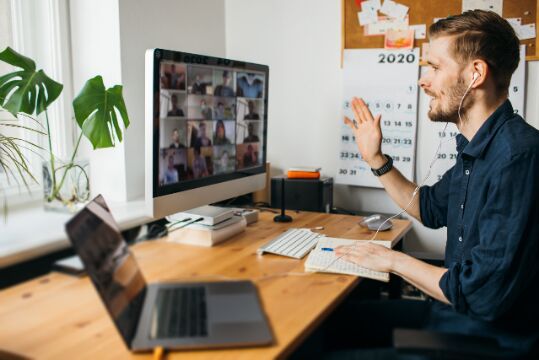Obsessed with your 'Zoom' look?
Long exposure to video calls has made us extra conscious of our appearance online — a little adjustment and guidance can help us out

Q. I am sending this question anonymously to ask whether I am the only one who spends all the time staring at myself during the zoom meetings? I feel I am getting self-obsessed to the point of constantly checking out myself and even spending hours fixing my "Zoom look'' and at points watching back meeting recordings to see how I looked during then. Please tell me this isn't only happening to me.
Ans. You are NOT alone. You have been struck by Zoom dysmorphia.
The COVID-19 pandemic brought with it a boom in Zoom calls. As these video calls have increased, so has the prolonged staring back at oneself during these calls. As a result of constantly staring at oneself, scrutinizing how one looks and talks in real time has led to an impact called Zoom dysmorphia.
"Zoom dysmorphia" is defined as an altered or skewed negative perception of one's body image that results from spending an extended amount of time on video calls.
A recent survey conducted by a few US dermatologists showed that there was a more than 50 per cent increase in dermatological and cosmetic surgery consultations. Most common concern was how people looked at their Zoom meetings, particularly about acne, wrinkles and hair loss. More people spent time loathing parts of their looks that stood out as unpleasant to them during their workdays which were mostly on Zoom meetings.
Psychodermatology is a study that combines psychiatry, psychology, human behavior and dermatology (including cosmetology and aesthetics). This human behavior is clearly indicative that remote work has affected patients' self-perception due to the time spent on these virtual video meets.
Why do we stare at our own faces?
As a society, we are hyper focused on physical appearances. Internalising those messages on ourselves leads to this fixation on our own faces. We tend to believe that others care about how we look, while the reality is that this is just a projection of our own needs and desires onto others.
What is BDD?
Body dysmorphic disorder is a mental health disorder in which you can't stop thinking about one or more perceived defects or flaws in your appearance — a flaw that appears minor or can't be seen by others. It can get crippling when one begins to develop comorbid depression, anxiety and avoid social situations, affecting the biological drives.
How to battle it out?
• Adjust your expectations: Don't conform to the societal norms of body image. Everyone looks a certain way. The pandemic may have been tough on you. Be kind to yourself.
• Adjust your technology and camera: A poor camera resolution can cause unnecessary worries and distortion of image. Use an ample light source. The closer and angulated a camera is, the worse the image appearance. Try to keep the camera at eye level to avoid distortion of image.
• Protect by disconnect: Reduce the amount of time staring into the camera by switching off the camera when not needed. Also limit social media engagement and editing photos beyond recognition.
• Mental health: A mental health professional can help identify features of body image issues, anxiety and depression that may be further worsening your zoom dysmorphia.
Send your questions to [email protected]



